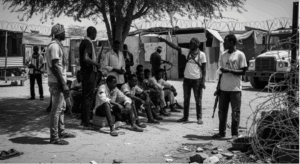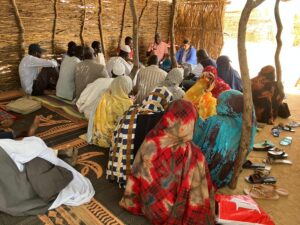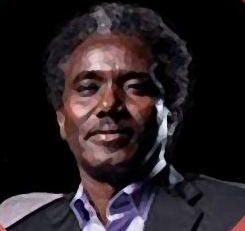Sudan at UNGA 80:
What must foreign actors and Sudanese do to ensure peace in Sudan?
By Bakry Eljak
Photo: UNGA in NY (US State Department)
The attention that the war in Sudan and the humanitarian catastrophe it has caused received in the corridors of the 80th session of the UN General Assembly was unprecedented through nearly three years of the war. This attention was reflected holding no fewer than 13 side events on Sudan during the 80th session of the UN General Assembly. The core focus of these events was the experience of the Emergency Response Rooms (ERRs), their funding, and their role in developing local mechanisms for humanitarian action while highlighting the role of young leadership. This experience is being treated as the only bright spot in a war that has produced the worst humanitarian catastrophe on earth today, without exception.
It is logical that the humanitarian catastrophe and experience of civilians should be at the top of the world’s concerns and highlighting such efforts are pragmatic responses to the need to raise funds, but the interest in this matter may also reflect an attempt to deflect from the failure of international actors to create a political path for stopping the war. Yet, despite the importance and nobility of the efforts of ERRs, they simply cannot meet all the needs of all 30 million of Sudanese civilians who are in dire need of humanitarian assistance across the country. Support for their work should not clear the political conscience of a world that has been unwilling to act decisively to promote a long-term political solution.
Positively, this General Assembly also highlighted the political aspect of the crisis, as many Arab and African presidents pointed to the need to stop the war and start a negotiation process immediately. These included His Highness the Amir of Qatar, Sheikh Tamim, and His Excellency President of Kenya William Ruto. Two other more important events took place at the UN General Assembly. First, the Quad countries (the United States, Saudi Arabia, the United Arab Emirates and Egypt) met at the foreign minister level and reiterated their commitment to implement the roadmap announced on September 12. Second, the Quad found support through a joint meeting of the European Union, the African Union, IGAD, the Arab League, the United Kingdom, France, Germany, as well as many African countries. The issue of Sudan has not received such attention, perhaps since the Comprehensive Peace Agreement in 2005 and or the 2019 revolution. Silencing the guns has not found an international consensus like what happened in the corridors of this General Assembly and on its sidelines. It is unfortunate that international interest in Sudan is focused on stopping a war. We (as Sudanese people) hope that the day will come when the world will be interested in Sudan because it is where scientists have discovered a vaccine for cancer or a technological solution to climate change. But what is more unfortunate is that Sudanese people themselves are not able to capitalize on these developments and turn global interest and attention into practical realities that lead to a ceasefire, cessation of hostilities, the return of civilian life, delivery of relief to the people, and the creation of a climate for a broad Sudanese-Sudanese dialogue that is inclusive enough to make the April 15 war the last war in Sudan. Such a process could lay the foundations for a social contract that establishes peaceful coexistence and celebrates diversity so that future generations can contribute positively to the beautiful march of humanity with scientific and industrial discoveries.

I fear that this may be the last chance to silence the guns. The consensus that has been reached among the members of the Quad, which are influential countries in Sudan, was not easy to come to and may evaporate quickly if not sustained. If these efforts collapse and the belligerents come to believe again in the possibility of a military victory, each of them will go to their allies at home and abroad to mobilize support for continuing the war. This would be a horrible nightmare whose end cannot be known, especially because the simple (maybe naïve) idea that either belligerent can remain cohesive enough to fight battles, liberate lands and achieve stability, may come to be seen as far-fetched. Then the day may come when the whole of Sudan will turn into a battlefield controlled by military factions built on ethnic ties and external connections for the extraction of resources and geopolitical positioning. The day may come when the violations we have witnessed so far will be nothing but a preview of the worse ones yet to come. There are no strategic or existential interests in the military alliances of the belligerents, no matter how much some try to embellish them with narratives of moral necessity. The longer the war continues the risk of parties losing the ability to control their forces increases, especially since the social divisions driven by ethnic and geographical polarization will continue to multiply and drive multiple and overlapping wars. If the Quad’s efforts collapse, can you imagine how long it will take us to get to this point again? How much loss and destruction will have occurred by then? In this context, the question is what is required from the Sudanese people and the region to ensure that these efforts do not fail?
Externally, international attention must be utilized to mobilize efforts to provide funds for the humanitarian aid that Sudanese need now and will continue to need in the days to come. Diplomatic communication among the Quad countries must also continue alongside sustained efforts to expand regional and international support for the Quad’s roadmap.
Inside Sudan, a massive media campaign must be designed to highlight the effects of the war on the people and their ways of thinking. I have not spoken to any Sudanese people inside or outside Sudan who have not complained of their misery, their hardship, their pain, and their fear that their reserves will soon run out. Sudanese who have returned and who are still displaced are in catastrophic circumstances and the specter of famine has become a living reality. Until this moment, I have not met a living, flesh and blood person who says that the war is good for them, which makes me believe that the social media profiles who want to continue the war to the last RSF or SAF soldier, or last remnant of the Bashir’s regime (Floul) or RSF aligned Sudan Founding Coalition (Ta’sis) are likely figments of the imagination. If they exist, they are not average, hardworking Sudanese seeking to help their families or relatives and suffering from the weight of debt and the sense of helplessness. They must have no relatives who are starving to death or begging in the streets of Cairo or other capitals or engaged in odd jobs to make ends meet. There is an urgent need to design projects to understand and reflect the feelings left behind by the war and to recognize the moral legitimacy and objective reality of these feelings, even if they are results of subjective experiences.

In the same vein, one can understand the anger and desire for revenge have blinded the hearts of many. Some make contradictory statements such as, “We are for peace, but peace is with whom or with what?” Then they give you a record of the violations of the RSF or SAF, and some of them go on to say that this is a foreign invasion and must be resisted indefinitely. Whether they know it or not, they are arguing in support of an indefinite war, as if peace were not an option. Simply put, peace is a necessity between real and imagined enemies. No matter how bitter the war is, the depth of its fissures and the grudges it has left in the souls of the people, stopping it is good and achieving peace presents a real opportunity to advance truth and justice. More importantly, in achieving peace, there is an opportunity to save the lives of (maybe) millions who may die if this war continues. As for the political objectives of the war, if there are still any, whether it is the defense of state institutions, the end of the phenomenon of multiple armies, the repelling of foreign invasion, return to power, building of a state of equal citizenship and justice, or the defeat of the Islamists, they can all be achieved by peaceful means. Therefore, the perception that this war is divine destiny or was imposed on any of its parties is deeply deceptive, and nothing but an instrument of war.

In summary, there is a favorable opportunity for peace in the Sudan, and the outside world should spare no effort to provide the financial and diplomatic support needed to make it a success. The Sudanese (in the country, the displaced, the refugees and the diaspora) must recognize that this may be the only opportunity to stop the war. Thus, all components of Sudanese society must get or stay involved in efforts to stop the war. As for the parties to the war (both in Port Sudan and Ta’sis), the message is clear: they can reach a political settlement. Such a settlement might not achieve their maximal aspirations, but it can establish a new starting point and political reality. This will be possible when Sudanese political actors abandon their myopic approach and limited imagination, which positions them in a zero sum game with real and imagined opponents. In fact, there are no permanent opponents in political arenas. If we all focus on common interests and not preconceived positions due to anger, fear and misconceptions, we will find that we, as Sudanese, have more common interest in stopping the war, achieving peace, and creating just and practical conditions for coexistence, than in continuing to fight. This includes the warlords (who have the greatest influence on war), who can make more money in peace than in war. To this end, the following are practical policy recommendations:
Form a permanent liaison body (from USA, KSA, Egypt and UAE) and resource it to develop practical plans for the implementation of the September 12 Roadmap.
Provide special funding for Sudanese civil society to develop and disseminate a narrative of peace and popularize the potential of peaceful solutions.
Mobilize Sudanese civil society organizations to develop this narrative and maximize the opportunities for peaceful coexistence among Sudanese.
Launch a campaign by INGOs working on Sudan and local NGOs to hold a series of events to operationalize the Quad’s call to obtain civilian inputs on modalities for ceasefire protection of civilians.
Refocus the African Union’s effort (as a leading regional organization with UN, IGAD, Leage of Arab States) to align with the Quad’s roadmap and ensure that the engagement of Sudanese civilians support the overall peace agenda without favoring a group supporting warring sides.
Bakry Eljack Elmedni
Professor of Policy at Long Island University Brooklyn,
Spokesperson for the Civil and Democratic Alliance “Somoud”


